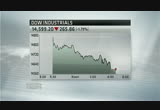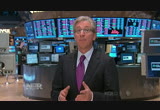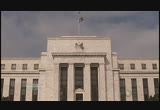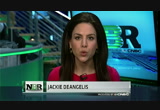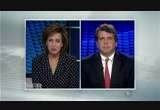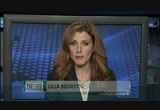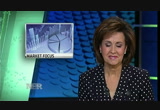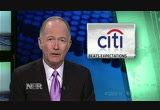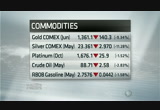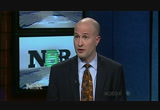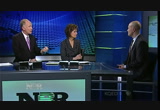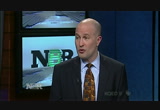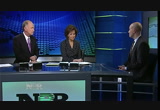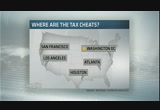tv Nightly Business Report PBS April 16, 2013 1:00am-1:30am PDT
1:00 am
quickly lost another 50 points and closed down 1.9%, the worst one-day drop since november of last year. the vicks or volatility index, also known as the fear index, also jumped and ended the day up over 40%. the day didn't start out much better. gold and other commodities dropped big at the open. gold in particular, down 10%. its worst one-day decline in 30 years. other commodity stocks like mital, tinto or cliffs natural resources were also weak. defensive names like walmart were also done, but fared better. the main catalyst for the sell off was concerns about slower global growth. china reported gdp for the first quarter below expectations. with europe in recession, trader rs now worried where is the growth going to come from.
1:01 am
i'm bob pisani at the new york stock exchange. >> as bob just mentioned, the price of gold plunged today, recording its second worst loss ever and closing below $1400 an ounce for the time in more than two years. today was the first time ever that the dow and price of spot gold both recorded triple digit losses. why is selloff and what may be next for the precious metal? jackie deangelis has our report. >> another massive selloff in the gold market today, but what's fuelling the fur rouse rotation? several factors are at play including the continued strength in the equity market. gold had lost its luster, but gold is also an inflation hedge and as long as the fed continues with its stimulus program, investors believe inflation is likely to remain in check. >> people thought the price of gold was a good hedge against stock market moves and forgot that the price of gold really is
1:02 am
an inflationary hedge and then you buy gold to preserve purchasing power. while we're not seeing the signs of inflation because commodity prices have not risen. interest rates have remained low, so the cost of commodities have not really gone u. >> but there's more to the story. part of bullion's breakdown is due to the cent strength in the u.s. dollar. >> if the dollar is strong, it becomes very expensive for people who do not have dollars to buy gold. >> meantime, troubles in europe are weighing on the precious metal as well. it's believed that cyprus may need to sell some gold to help cover its deficit. whale analysts don't feel it would have a huge impact on the overall market, they worry it sets a precedent for other troubled countries. while others believe gold will rebound, the thought is that the pile on selling doesn't last.
1:03 am
>> the chances are that it will go up and down for a few weeks around then stabilize and the buyers will then step in. >> while some are worried about how the decline might impact their pension plans, it usually tends to be a small percentage of a diversified portfolio. the decline might be balanced out by gains in equities and there's even a silver lining. for those in the market to buy the commodity itself or gold jewelry, this could be a time to jump in. >> that tumble in gold prices also prompted a rare retraction from bill gross. the founder and co-chief investment officer of pimco. at a barrens magazine event last month, he predicted prices wouldn't move much unless real interest deklaclined further or expectations rose higher.
1:04 am
neither happened. today, he tweeted, okay, so, i made a bad call. i would still buy gold here, end quote. >> joining us now to make sense maybe of today's big sell off in commodities and stocks, the chief market strategist of c convergis. you think there's a dramatic furn for those right now, don't you? >> i do. let's start with gold. gold has been a major inflation hedge, however, with the threats of many central banks in europe having to sell a bit of their gold holding, i think investors are worried about a lot of supply coming to the market. cyprus is just a teeny bit of it. you have portugal, spain, france, italy, who have tons of gold in their vaults and any part of that comes out, there's going to be a lot of supply. >> nick, a lot of investors tonight are scratching their heads saying, what happened? all these past couple of weeks
1:05 am
and months, there have been new records on wall street and all the stock averages and they've been told the economy is doing great, so what's changed? you know, what's changed is that we got a little complacent. i think everybody looks at the market and says we weren't really fulling gauging what might happen if the economy slows down or doesn't speed up. i think today was just the wreck reckoning for a lot of those concerns. >> we've been in a period where people are expecting a correction from whatever highs we've been hitting here lately. do you think this is the beginning of that correction right now? >> i think we're certainly seeing a bit of a correction. i don't know how much more it has tooz, however, because fundamentally, we have very low interest rates and u.s. corporations are still posting record high levels of earnings against the backdrop of a weak global economy. if we get a big downdraft from whatever happens out of boston or some other factor, that's a
1:06 am
real risk factor, but near term, very strong earnings, hard to argue with stocks with that backdrop. >> you just mexed the boston marathon incident. we doebt have the complete story on that tragedy, but events like that do impact investor psychology. how much? >> that's right. really two factors to focus on. first, what effect does it have on consumer confidence? first question, how does it affect consumer spending, psychology. the broader issue is more nebulous. what are the geopolitical ramifications of the event. we've had examples over the past 20 years, oklahoma city or 9/11, some have very profound impacts on geopolitical impacts and the economy and some not as much. >> since the woes of last year, there's been a mind set of investors to buy the dips.
1:07 am
as the market comes lower, they step in and see an opportunity to buy. now, we've had a pretty good selloff in the past couple of days and so far, nobody's stepping in. do you think they will or should they at that point? >> you know, i think in terms of thinking about how to invest and over what time frame you are investing, if you're investing for a three or five-year horizon or longer, ultimate you focus on the fact that corporate earnings are strong. if you're a trader or if you have seen the action over the past couple of days and it scares you and you think you're overexposed to equitieequities, probably is time to take some off the table because you're overexposed and your risk comfort is out of reality. >> nick, you have a standard asset allocation. 60% stocks and you really don't change it. whether stocks are going up or down. what is your advice to investors? what should they do right now,
1:08 am
just sit tight? >> yeah, 60-40 is a very solid split. it maximizes return and minimizes volatility. if you have seen the action over the past few days and you're comfortable, it makes sense to sit. a lot of your viewers are probably sitting on some sizable gains over the past few years. for those investors, i would recommend paring back on equi equiti equities. >> nick, the chief market strategist at convergis. thank you. >> shares of sprint were as good as gold today, shooting up nearly 14%, easily making it the biggest gainer in the s&p 500. the reason, dish network is offering to buy sprint for $25 billion and this is the second takeover bid for the wireless phone carrier. julia borsen has more. >> sprint is at the center of a
1:09 am
takeover battle. today, dish, offering to buy the company to trump the proposal from softbank. dish saying the offer is a superior alternative. a 13% premium to softbank's $20 billion bid to buy 70% of sprint. the chairman saying quote, a transformtive merger will create the only company that can offer customers the fully integrated nationwide bundle. he is trying to push dish from the slower growing pay tv business into the faster growing wireless industry and to break the mold of his pay tv rivals like directv and comcast. the bid comes at a time of consolidation in the wire redskins industry and growth inr the broad band business. he wants to offer a wireless alternative by making this deal
1:10 am
with sprint, which he says is well positioned to offer wi-fi in dense areas. a bold move in a competitive landscape that raised concerns for some analysts. >> on the one hand, capital dis would be spending everything they have in order to acquire sprint. they then don't have the capital to invest in sprint and extract all the value they would have amassed. the second thing is operating skill. they don't have a track record in wireless. >> now the ball is in sprint's court. softbank could make a kounts offer and the dish snags sprint, it will push all the pay tv providers to find new ways to distinguish their bundle. >> also from the wireless phone industry today, the board at metro pcs, the nation's fifth largest carrier, has approved an amended takeover bid from rival t emotional and is urging shareholders to okay the deal. >> coming up, the one big bank
1:11 am
1:12 am
thermo fisher scientific, a maker of lab equipment, is buying life technologies which makes gene sequencing machines. they finished down 1%, but life technologies jumped to $73 a share. glaxosmithkline touched an all time high after the food and drug administration gave a better than expect ed review of an experimental treatment for lung disease. this could open the way for approval when the new treatment will be reviewed by an fda panel on wednesday. gsk gained 1.5% to $49 a share. >> as the media space reshapes itself, btig research began coverage of netflix with a $250 per share price. noted that the service is being offered as part of internet bundles as well as cable providers, rich greenfield said netflix has an improved price
1:13 am
relationship. netflix gained about 2% on an otherwise down day today. energy was the worst performing sector today as oil dropped below $89 a barrel. the blue chip oil, they were near the bottom of the dow. each down about 3% in today's trade. >> solid quarterly earnings from charles schaub, but missed by a penny a share. partly because the firm weighed fees on money market funds. shares tumbled almost 4% to $16 a share. >> and on a day that saw share of nearly every bank or financial firm lower, citigroup shares bucked that trend, rising a fraction higher after beatinging analyst estimates last quarter, chalking up a profit of $4 billion by pulling more revenue and setting aside less funds for bad loans. >> now that citigroup has
1:14 am
reported its latest result joining wells fargo and jpmor n jpmorgan, investors are waiting to hear from one more huge bank and that one may reveal more about the health of the banking s sector more than any other lender. kayla tell ls us which bank and why as we begin a new series this week, "earnings spotlight." >> for bank of america, it's been a year of reckoning. lawsuits put behind it, the stock doubles and after years of pushback from regulators, capital is finally being returned to shareholders. earlier this month, b of a took advantage of this good news with an ad campaign. reconnecting with customers. but the biggest test comes wednesday. jpmorgan and wells fargo reported last week, showing some first quarter weakness. the reason, the mortgage boom going quiet. homeowners once rushing to refinance at low rates boosting bank's loan volume and canceling
1:15 am
out thin margins. now, a thing of the past. wednesday will show how much boa has a stake there. then there's expenses. dig into $8 billion of cost cuts, thousands of layoffs. jeff hart is looking for progress in one specific area. >> big thing for bank of america is how quickly can they get the problem loan mortgage servicing portfolio down. that's an important part of taking bank of america where it is now to where i think it should and will be as one of the more efficient banks in the country. >> hart says the banks should benefit from more companies selling stocks and bonds in the first quarter. a surprise positive for citigroup and wells fargo with franchises far less developed than b of a. investor expectations are high, a welcome change for a bank with a troubled past. >> i think bank of america has been executing on their plan for
1:16 am
a good year now, coming off bottom and proving their capital ratios, talking out costs and the investment bank hastm performed well. >> the question, whether the momentum can continue. for nightly business report, i'm kayla toshi. >> tomorrow, our earning spotlight series continues when we highlight the one tech report to watch. still ahead tonight, rising home prices, strong demand, even bidding wars. is this what the healthy housing recovery looks like? but first, let's take another look at commodities.
1:17 am
shares of home builders got hammered today along with the rest of the market after homebuilder sentiment fell in april for the third month in a row. the nnhb wells fargo index slid to a reading of 42 down from 44 last month. the index also fell below economists expectations. builders say they're worried about getting hold of construction loans and rising costs for materials. but our next guest is slugging off today's down beat report. he says the housing recovery remains robust. here to tell us why, jed, chief economist at trulia. this is a real estate with
1:18 am
website. so, we are getting mixed reports. some places, home prices are up. a lot of demand, other markets, just the opposite. is this a regional housing recovery? >> we're seeing the recovery strongest in two types of markets. marks that have strong job growth like san francisco, seattle, denver. but we're also seeing strong price increases in places that were hit hard in the housing bust. places that saw big price declines line phoenix, vegas and detroit. >> i was in los angeles over the weekend and the lead story of the los angeles on sunday was a bubble market where there are options happening once again for homes being sold there, mainly because of a dirth of supply. >> inventory is very tight, especially in california, but across the country. a few reasons for that. first of all, prices bottomed about a year ago and nobody wants to sell at the bottom, but everyone wants to buy at the bottom, so people who have the choice may be waiting to sell
1:19 am
until the prices are higher. construction levels are still are low, even though they're up from where they were at the worst point of the bust, construction still way below normal level and not keeping up with the rate of household formation. >> there are still a lot of homes in the foreclosure process and at some point, they're going to be put on the market. what is that going to do to business demand, home prices? what happens? >> that foreclosure backlog is now pretty localized. in places like florida, new york, new jersey and illinois, there's a large shadow of inventory of foreclosed homes. not in midweost of the rest of country. the foreclosures take very long to go through the process and therefore, a big backlog. >> interest rates, a key component in this and the fed has a lot to say about that. by keeping long rates low, mortgage rates are still near record lows right now. houchl longer do you think that
1:20 am
lasts? >> rate rs still near historic lows. most expect rates to go up, between now and a year from now. the biggest effect that will have is on refinancing. it will have smaller effect on home purchases because so many go into a decision on whether to buy or rent. even if rates went up two full points, it would still be cheaper to buy than to rent. >> if you're a buyer, do you buy now when the prices are still low and if you're a seller, do you hold out because maybe prices are going to go up? >> it's definitely seller's market. inventory is very tight and now the that the economy is recovering, there are many buyers that are interested. the challenge for buyers is even if they can halt back for mortgage and have enough for a down payment, there's not much to choose from. buyers want to jump in before prices and help prices raise
1:21 am
further might have more to choose from and have to settle. >> lenders, we are told, have still been pretty tight. not as loose as they were before the debacles of 2009. are they lending as much as they could be right now? >> right now, the average credit score, people are getti inting mortgages is still high. the average down payment is still higher than it typically is. that reflects the fact that lending is still tight. it's very hard for people to borrow more than they can afford. those tight standards are one of the things that's preventing us from getting back into bubble territory. we'll have to see if some of these new mortgage rules, this toxic lending that we saw during the bubble has a big impact on mortgage credit. >> a lot to think about. we really appreciate. the chief economist at trulia. it's a different market depending on where you live.
1:22 am
>> the old sayinging, all real estate is local and we can talk all we want about national trends in real estate. i think it's clear that the housing market is recovering, but there are so many factors that go into it. certain regions that are the hardest hit may bounce back quicker. >> those auctions and bidding wars make it tough for people who want to buy. >> i went through that process in los angeles years ago. finally tonight, just a friendly reminder, it is tax day. a new study from a group called the national taxpayer advocate using confidential tax data for being most likely to fudge on their returns. some of the hot bed areas, los angeles, san francisco, houston, atlanta and washington, d.c. and some of the top small businesses that raise red flags are construction companies, real estate rental firms because they tend to write off so much. so, there's so much going on
1:23 am
1:28 am
99 Views
IN COLLECTIONS
KQED (PBS) Television Archive
Television Archive  Television Archive News Search Service
Television Archive News Search Service 
Uploaded by TV Archive on

 Live Music Archive
Live Music Archive Librivox Free Audio
Librivox Free Audio Metropolitan Museum
Metropolitan Museum Cleveland Museum of Art
Cleveland Museum of Art Internet Arcade
Internet Arcade Console Living Room
Console Living Room Books to Borrow
Books to Borrow Open Library
Open Library TV News
TV News Understanding 9/11
Understanding 9/11